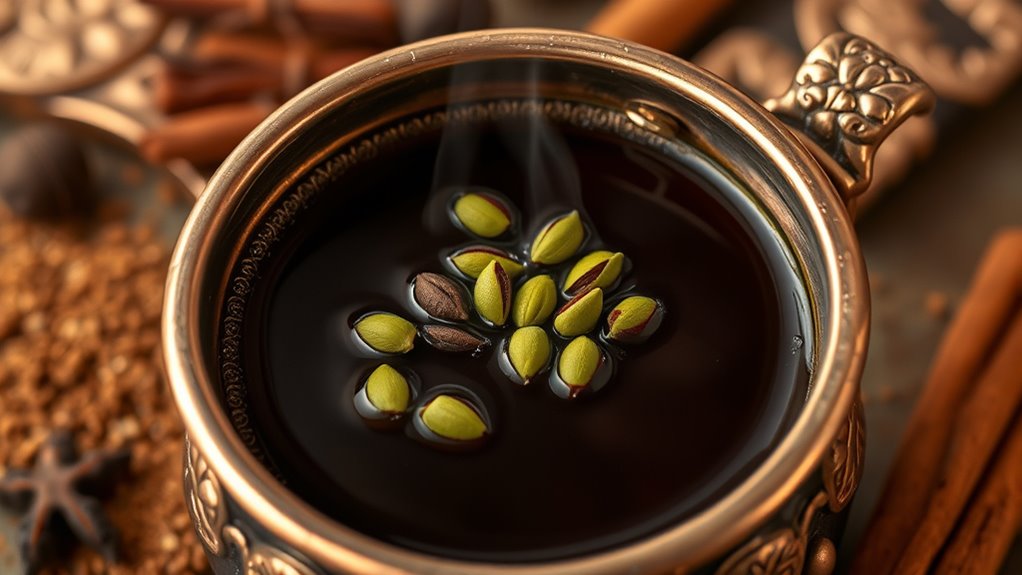Spiced Turkish coffee elevates the traditional brew by adding aromatic ingredients like cardamom, cinnamon, or clove, enhancing its rich, complex flavor profile. You gently stir the finely ground coffee with water and your chosen spices before brewing slowly in a cezve over gentle heat. The result is a fragrant, velvety cup with a delightful foam, perfect for sharing. If you keep exploring, you’ll discover more about the cultural significance and unique preparation techniques behind this cherished tradition.
Key Takeaways
- Cardamom is the most traditional and prized spice used to enhance Turkish coffee’s aromatic profile.
- Other spices like cinnamon and clove can also be added for additional flavor complexity.
- Spices are incorporated during brewing, often ground with the coffee or added to the water beforehand.
- Using spices elevates the sensory experience and deepens the cultural richness of the coffee ritual.
- Spiced Turkish coffee is often enjoyed during special occasions or social gatherings to symbolize hospitality.

Have you ever wondered how a simple cup of coffee can be transformed into a rich, aromatic experience? When it comes to Turkish coffee, this transformation is rooted in centuries of tradition, skillful coffee preparation, and a deep cultural significance that goes beyond just caffeine. Every step you take—measuring finely ground beans, adding water, and carefully boiling—embodies a ritual that connects you to a long history of social gatherings, hospitality, and storytelling. Turkish coffee isn’t just about waking up; it’s about savoring a moment, sharing it with others, and honoring a heritage that values the art of brewing.
Turkish coffee transforms simple beans into a centuries-old ritual of taste, tradition, and shared moments.
The process of making Turkish coffee is deliberate and precise. You start with very finely ground coffee—more powder than typical drip coffee—because the texture is essential for the authentic experience. As you add water and sugar, you stir gently to dissolve everything evenly before placing the cezve (or ibrik) on the heat. The key is patience: you don’t rush the boiling process. As the mixture heats, a foam forms—a sign that your coffee is ready to be poured. This foam is highly valued in Turkish coffee culture; it’s a mark of a well-prepared brew and a sign of respect for tradition. When served, it’s often accompanied by a glass of water and sometimes a sweet treat, reinforcing the communal and ceremonial nature of the drink. Additionally, the use of spices like cardamom elevates the flavor profile, adding a layer of aromatic complexity that is cherished in Turkish coffee.
What makes Turkish coffee truly special is its cultural significance. It’s more than a beverage; it’s a symbol of hospitality, friendship, and continuity. Inviting someone over for coffee isn’t just about serving a drink; it’s about sharing a piece of history. Traditionally, Turkish coffee is served in small cups, and the act of pouring and drinking signifies trust and closeness. The ritual often involves reading coffee grounds—an art called tasseography—adding a mystical element that deepens the cultural experience. Over generations, the preparation and serving of coffee have become a way to connect with loved ones, show respect, and celebrate community.
In essence, every sip of Turkish coffee carries the weight of tradition, the aroma of spices like cardamom (and sometimes others like cinnamon or clove), and the warmth of shared moments. When you embrace this method of coffee preparation, you’re not just making a drink—you’re participating in a centuries-old cultural practice that highlights the beauty of simple, mindful rituals. Turkish coffee’s rich history and cultural significance make each cup a meaningful experience, blending taste, tradition, and storytelling into one aromatic brew.
Frequently Asked Questions
Can You Add Sugar to Spiced Turkish Coffee?
Yes, you can add sugar to spiced Turkish coffee. You have plenty of sweetening options, including traditional sugar or alternative sweeteners like honey, agave, or stevia. It’s best to add sugar before brewing, so it dissolves well and blends with the spices. Adjust the amount to your taste, whether you prefer a lightly sweetened or very sweet cup. Experiment with different sweeteners to find your perfect flavor.
What Other Spices Pair Well With Cardamom?
Imagine your taste buds dancing in a spice symphony—cloves, cinnamon, and nutmeg are perfect flavor pairings with cardamom. These warm, aromatic spices weave together seamlessly, creating rich, layered spice combinations that elevate your coffee experience. Cloves add a bold punch, cinnamon offers sweet warmth, and nutmeg lends a hint of earthiness. Together, they transform your brew into a mesmerizing journey through spice-laden landscapes.
Is Spiced Turkish Coffee Caffeine-Free?
Spiced Turkish coffee isn’t caffeine-free; it typically contains caffeine from the coffee beans used. If you’re seeking herbal alternatives with no caffeine, you can try herbal teas like chamomile or peppermint. The caffeine content varies depending on how it’s prepared, so if you’re sensitive or avoiding caffeine altogether, opt for herbal infusions instead. Always check labels to confirm your beverage fits your caffeine intake preferences.
How Long Should I Brew Turkish Coffee?
You should brew Turkish coffee for about 3 to 4 minutes to achieve ideal extraction. Keep the heat low and watch closely, as over-brewing can make it bitter, while under-brewing leaves it weak. The key is to slowly heat the coffee until it foams, then remove it from the stove. This ensures you get a rich, flavorful cup with the perfect balance of strength and aroma.
What Are Traditional Turkish Coffee Accompaniments?
Imagine you’re in a bustling bazaar in the 16th century, embracing a rich coffee ritual. Traditional Turkish coffee accompaniments include a glass of cold water to cleanse your palate, a piece of Turkish delight, or sweet baklava, which enhance the cultural traditions. You might also enjoy a small spoon for stirring or a side of Turkish tea. These elements deepen your experience and connect you to centuries of coffee rituals.
Conclusion
So, next time you brew Turkish coffee, don’t be shy about adding those spices. Think of it as turning a simple cup into a treasure chest of flavors—each sip revealing a new surprise. Whether you stick with cardamom or experiment with other spices, you’re crafting more than just coffee; you’re creating a warm, aromatic hug in a cup. Enjoy every sip, and let the spices elevate your coffee experience like a melody that lingers.









